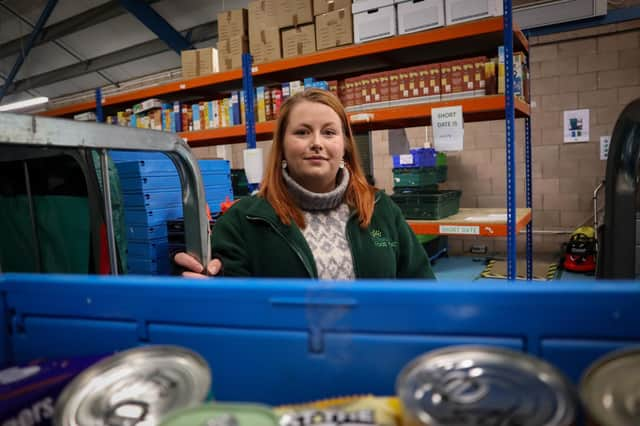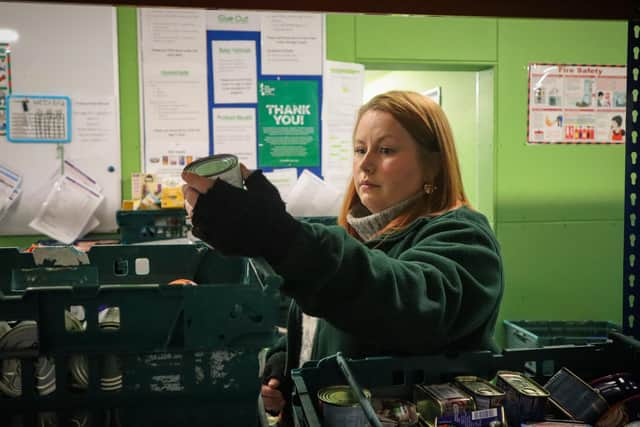Food banks: Scottish families go hungry over Christmas as food donations struggle to meet demand


In a warehouse on the western edge of Edinburgh’s housing estates, hundreds of empty crates - representing thousands of missing food parcels - are stacked up, waiting to be filled as demand for lifesaving food parcels far outstrips supply in Scotland’s capital.
Each parcel contains enough food for three meals, for three days for families. A parcel for one or two people contains 30 items, including basics such as cereal, fruit juice, milk, coffee and pasta.
Advertisement
Hide AdAdvertisement
Hide AdEach crate is used to store and sort several food parcels, but at the Edinburgh Food Project’s (EDP) warehouse in Broomhouse, hundreds of crates are unused.


Bethany Biggar, the director of EDP, said her organisation gave out more food parcels last month than it did in November 2021 and November 2022 combined.
In a freezing, hastily-converted office in the roof of the project’s warehouse, Ms Biggar said Christmas is usually a time when donations come quickly, but not anymore.
“Broadly speaking, donations have held steady over the year,” said Ms Biggar, “but when you add in the increase in need, and the amount of people that access the food banks, things that would have lasted us are no longer lasting.
“Normally, Christmas donations that we would bring in in December would last us through February - March at a push - it would take us through the quieter months of donations.
“This year, the donations we have received will realistically last until the end of December, if we're lucky.
“There's not going to be anything left over in January, we're going to be back to square one in January.”
The EDP gave out 1,839 parcels in November 2023, and expects to give out around 2000 food parcels in December, containing a total of 25,000 individual food items, as well as toiletries.
Advertisement
Hide AdAdvertisement
Hide AdNormally, December is “madness”, said Ms Biggar, with “the joy of the moment” spurring people to come in with donations.
“It's just a really wonderful kind of time of giving and sharing,” she said, “but while people are still coming, it's noticeably quieter.
“We used to have to fight over the last empty crate, because we had so much coming in, but you saw the unused crates when you came in, and unless the next few weeks go phenomenally, we’re still going to have unused crates in January.”
According to the Trussell Trust, one in five food parcels in Scotland go to working adults, while three quarters go to adults with a disability.
Ms Biggar said this shows welfare payments are not enough to keep people out of poverty.
“Simply put, people do not have enough money,” she said.
“For whatever reason, money does not stretch far enough. The level of social security benefits is too low to cover the essentials. Universal Credit is not enough to cover everything you need to live.
“The amount of money people are given is just abysmal, but then the government doesn’t tell people they are entitled to additional income.”
The EFP runs a money advice service, which helps people access benefits they are entitled to, but which people “aren’t signposted to or told about”.
Advertisement
Hide AdAdvertisement
Hide AdThis year alone, the money advice service has secured an additional £260,000 for people.
One person found out they were entitled to £24,000 of additional benefits, which included a backdated payment of £15,000, but only after the money advice service appealed the government’s decision and took the case to a tribunal, which ruled in their favour.
“How is someone supposed to navigate on their own?” said Ms Biggar.
“How are you supposed to figure that out when you’re unwell, when you have general health issues, on wheel.
“With the additional stress added on top of that, people are just living in this constant state of fight or flight, they’re in survival mode.
“That takes a toll on people.”
Research from the Joseph Rowntree Foundation, published in February, found that 90% of low-income households on Universal Credit were going without essentials.
“Support has eroded over decades and the basic rate (‘standard allowance’) of Universal Credit is now at its lowest ever level as a proportion of average earnings,” the report reads.
“Almost half of households see their payments reduced by deductions and caps.
Advertisement
Hide AdAdvertisement
Hide Ad“For example, a household can lose 25% of their standard allowance to repay debts to DWP.”
“Inadequate social security is the main driver of food bank need, with almost 1.3 million parcels given out from Trussell Trust food banks between April and September 2022.
“Without an adequate safety net, a setback can be hard to overcome. Poverty comes at a significant cost to the individual, but also to the economy and wider society, with downstream costs to public services such as the NHS.”
When asked what Scotsman readers can do to help, Ms Biggar said: “If you can afford it, please make a donation, and whether that's a can of soup or a financial donation, no matter how small.
“If you can't afford to, then please challenge people's perceptions of food banks. Raise the voices of food banks and tell people what's going on and when you vote, vote thinking of the people that use the food bank in mind.”
Financial donations to the Edinburgh Food Project can be made on JustGiving, here.
Comments
Want to join the conversation? Please or to comment on this article.